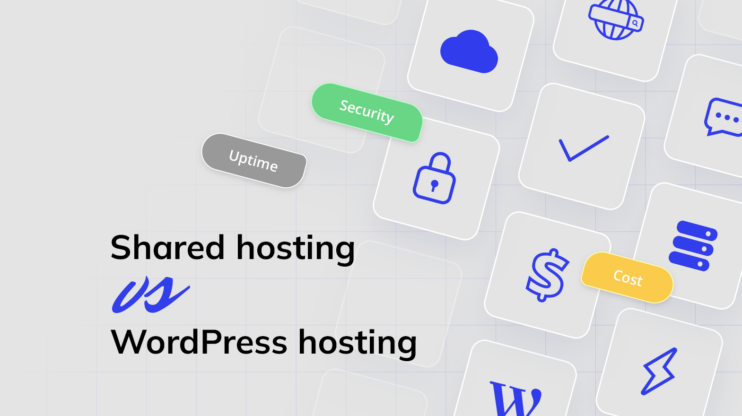Choosing the right web hosting solution is essential for anyone looking to build a strong online presence. Two popular options are shared web hosting vs Virtual Private Servers (VPS).
For those just starting, shared hosting might be an easy and cost-effective choice as it involves sharing server resources with other websites. This can make it affordable, but it might limit performance during high-traffic times.
On the other hand, VPS hosting provides a middle-ground solution that offers more control and better performance compared to shared hosting.
VPS hosting gives users dedicated resources and greater control over server settings, making it ideal for websites that need more power or have higher traffic demands. Although VPS hosting is typically more expensive than shared hosting, the benefits often justify the cost for growing websites that need extra resources.
Understanding the core differences between shared hosting and VPS hosting can help site owners make an informed decision.
By evaluating factors like performance, control, and budget, individuals can select the most suitable option to support their website’s growth and goals.
FAQ
Is VPS better than web hosting?
VPS hosting can be better than web hosting if you need more control, dedicated resources, and better performance. It’s ideal for websites with higher traffic or requiring custom configurations. For simpler sites or beginners, shared hosting may be sufficient, as it’s more affordable and easier to manage. WordPress sites, for example, can benefit from VPS for faster load times and scalability.
What is the difference between VPS and shared web hosting?
The main difference between VPS and shared web hosting is resource allocation. In shared hosting, multiple websites use the same server resources, which can affect performance. VPS offers dedicated resources in a virtual environment, providing more control, better performance, and greater customization. This makes VPS ideal for websites that need more power, such as larger WordPress sites.
What is the difference between VPS hosting and cloud hosting?
VPS hosting provides dedicated resources on a single server, while cloud hosting uses multiple servers to distribute resources dynamically. Cloud hosting offers better scalability and uptime by adjusting to traffic fluctuations across a network of servers. VPS is more stable in terms of allocated resources, while cloud hosting excels in flexibility and redundancy.
Can a VPS host a website?
Yes, a VPS can host a website. In fact, VPS hosting is a popular choice for websites that need more power, control, and security than shared hosting offers. It’s perfect for WordPress sites, where users can install custom software, configure their own settings, and scale resources as their website grows.
#1 Managed WordPress Hosting
Try 10Web for free, and enjoy all the benefits of a secure Google Cloud Partner hosting.
What is web hosting?

Web hosting is an online service that lets people publish websites or web pages on the internet. Hosting providers like Hostinger, 10Web, and DreamHost offer the technologies needed for this process.
When users purchase a plan, they essentially rent space on a server to store website files.
There are different types of web hosting to meet varying needs. The most common type is shared hosting, where multiple websites share a single server.
This option is typically cheaper and designed for smaller sites. It is suitable for beginners due to its affordability and ease of use.
Other types of hosting include Virtual Private Server (VPS) hosting, which provides more control and resources.
Web hosting plans can vary significantly. Some plans offer unlimited data transfer and storage, while others may have more restrictions.
It’s important to carefully review what is included in a hosting plan to find the right match for the website’s needs.
In choosing a hosting provider, users often consider factors like reliability, customer support, and scalability.
Some providers offer extra features such as one-click installs for popular apps and free domain names, making them attractive choices for both beginners and experienced users.
Advantages of shared web hosting
Web hosting is cost-effective, especially for small websites or beginners, as it provides shared resources at an affordable price. It’s easy to set up with minimal technical knowledge and often includes features like one-click installers, website builders, and customer support, making it user-friendly for non-technical users.
Disadvantages of shared web hosting
The main downside of web hosting is the limited control and performance. Since resources are shared among multiple users, websites can suffer from slow loading times and downtime if another site on the server uses excessive resources. It also lacks flexibility and scalability for growing websites.
Types of web hosting
Web hosting comes in different types, each offering unique features and benefits. Choosing the right one depends on specific needs, such as budget, control, and technical expertise. Here’s a look at several options available.
Shared hosting
Shared hosting is an affordable option where multiple websites share the same server resources. It suits beginners and small websites with low traffic.
This type is cost-effective, but it may experience slower performance if other sites on the server get busy.
Best for: Personal blogs, small business sites, and beginners.
Dedicated hosting
Dedicated hosting gives a single website full access to an entire server. This provides strong performance and customization options.
It’s great for large websites with significant traffic and complex hosting requirements. With full control, a business can adjust server configurations to match exactly what it needs.
Best for: Large sites, ecommerce platforms, and businesses with specific requirements.
WordPress hosting
WordPress hosting is tailored for sites using the popular WordPress platform.
It includes features like pre-installed themes and plugins, as well as automatic updates. This makes it easier for WordPress users to get going without technical hurdles.
Enhanced security and support for WordPress-specific issues are also part of the package.
Best for: Bloggers, small businesses, and WordPress enthusiasts.
WooCommerce hosting
WooCommerce hosting is designed specifically for online stores using WooCommerce on WordPress.
It ensures optimal performance with features that target ecommerce needs, such as secure transactions and product handling.
These plans focus on ease of use and reliability for running an online shop.
Best for: Ecommerce ventures, WordPress entrepreneurship, and those using WooCommerce.
VPS hosting
VPS hosting stands for Virtual Private Server. It offers more control and resources compared to shared hosting, without the full costs of a dedicated server.
Users can install custom software and choose their operating system, making it ideal for websites growing beyond shared hosting limits.
Best for: Medium-sized businesses and developers needing customization.
Cloud hosting
Cloud hosting operates across multiple servers, providing flexibility and high availability.
It adjusts resources according to demand, making it cost-effective for sites with fluctuating traffic. If one server encounters an issue, others in the network keep the site running smoothly.
Best for: Growing sites, ecommerce projects, and high-demand applications.
Reseller hosting
Reseller hosting allows individuals to purchase hosting and then sell it to others.
This is a perfect choice for web designers or developers looking to offer hosting as an additional service to clients. Resellers can manage accounts and services, branding them uniquely.
Best for: Entrepreneurs, web designers, and developers seeking to expand their business.
Email hosting
Email hosting focuses on providing secure, custom email services.
Businesses can use their domain for email addresses, making them professional and memorable.
Plans often include spam filters, plenty of storage, and support for common email protocols.
Best for: Businesses and professionals requiring customized, dependable email solutions.
What is a virtual private server (VPS)?

A virtual private server (VPS) is a type of hosting that uses virtualization technology to provide dedicated resources.
VPS hosting offers more control and flexibility compared to shared hosting and is more affordable than a dedicated server.
Customization and control
VPS hosting provides a high level of customization and control that appeals to many users.
Unlike shared hosting, where many websites use the same server, a VPS offers a private environment.
Users can install their own operating system and software, allowing for greater personalization.
Root access provides the ability to modify system files and settings, which is beneficial for developers.
Having dedicated resources ensures consistent performance. This feature makes VPS ideal for medium to high-traffic websites.
The user can choose their own configurations, optimizing server settings to meet their specific needs.
Managed vs unmanaged VPS
Managed VPS comes with support services where the hosting provider handles server maintenance, updates, and technical support.
This option is perfect for those who want convenience without dealing with technical details.
Unmanaged VPS, on the other hand, leaves server management to the user.
This requires technical knowledge, as the user is responsible for maintenance, security updates, and solving issues.
With unmanaged VPS, users have greater independence and control.
Each type of VPS management suits different users. Those comfortable with server management may prefer unmanaged VPS, while others may choose managed VPS for its ease of use.
Advantages of VPS
VPS (Virtual Private Server) hosting offers more control and flexibility compared to shared web hosting. Each user gets dedicated resources, improving performance and stability. It allows root access and customization, making it ideal for websites that need more power or run custom applications. VPS hosting also scales more easily with the growth of a website.
Disadvantages of VPS
VPS hosting is more expensive than shared hosting and requires more technical expertise to manage, especially if it’s unmanaged. Users must handle software updates, security, and performance optimization, which can be challenging for beginners or those without server management experience.
#1 Managed WordPress Hosting
Try 10Web for free, and enjoy all the benefits of a secure Google Cloud Partner hosting.
Similarities of web hosting vs VPS hosting
Traditional web hosting and VPS (Virtual Private Server) hosting both make websites accessible on the internet. They provide storage, bandwidth, and server management to host websites, allowing users to upload files and manage their online presence. Additionally, both types offer varying levels of technical support and resources depending on the hosting provider and plan, and they can include similar features such as domain registration, email hosting, and SSL certificates.
Differences between web hosting vs VPS hosting
The main difference lies in resource allocation and control. Web hosting, often referred to as shared hosting, involves multiple websites sharing the same server and resources, which limits flexibility and performance. VPS hosting, on the other hand, provides dedicated resources through virtualization, offering more control, customization, and scalability. While web hosting is more affordable and suitable for smaller sites, VPS hosting is ideal for websites needing higher performance, security, and control, making it a more expensive but powerful option.
Comparing shared web hosting vs VPS hosting
Web hosting vs VPS (Virtual Private Server) hosting are two popular options for hosting websites. Web hosting is typically more suited for smaller sites with lower traffic, offering shared resources, while VPS provides more control, customization, and dedicated resources, making it ideal for growing businesses or websites with higher traffic.
| Comparison Point | Web Hosting | VPS Hosting |
|---|---|---|
| Performance | Shared resources can lead to slower speeds during high traffic times. | Dedicated resources ensure more consistent performance and faster load times. |
| Scalability | Limited scalability, ideal for smaller websites. | Easily scalable, suitable for growing websites or businesses. |
| Reliability | Less reliable due to shared server space, prone to downtime from other users. | More reliable with isolated environments and fewer disruptions. |
| Management | Usually fully managed by the provider, requiring minimal technical knowledge. | Can be self-managed or managed by the provider, offering more control. |
| Customization | Limited customization due to shared server settings. | High customization, with root access and control over the server environment. |
| Security | Basic security measures, but shared server increases vulnerability risks. | Better security with dedicated resources and isolated environments. |
| Migration | Limited migration options as it is tied to a shared server environment. | Easier migration due to isolated and flexible server setups. |
| Cost | Generally cheaper, as resources are shared among many users. | More expensive than web hosting, but offers better performance and control. |
Performance considerations
When choosing between web hosting and VPS, performance is a key aspect to consider.
Server resources and uptime
Web hosting vs VPS differ in how server resources are allocated.
With web hosting, multiple websites share the same server resources like CPU and RAM. This can lead to slower performance if other sites use too much bandwidth.
On the other hand, VPS hosting provides dedicated resources for each user. Users get a specific amount of resources, leading to more stable performance.
Uptime is another important factor.
Web hosting can be less reliable because of shared resources. Conversely, VPS hosting usually offers higher uptime, which means a website is less likely to go offline. Both types of hosting providers will offer uptime guarantees.
Handling high traffic
Web hosting might struggle with high traffic since resources are shared among multiple websites.
During sudden traffic spikes, a website could slow down or even crash. This can be a major concern for busy times or promotional events.
VPS hosting usually handles high traffic better. With dedicated resources, VPS can adapt to increased demand.
Users can often scale resources up or down depending on need, making VPS a good option for websites expecting variable traffic.
Scalability ensures that performance remains consistent even during busy periods.
Security and reliability
In the realm of web hosting, security and reliability are critical for safeguarding user data and maintaining constant uptime. Choosing between the different types of web hosting and VPS hosting significantly affects these aspects.
Protecting user data
When it comes to protecting user data, VPS hosting offers enhanced security features.
VPS hosting isolates user data by providing a separate environment for each account on the server. This ensures that even if one account is compromised, others remain unaffected.
Encryption plays a big role in safeguarding information like payment details.
Both web hosting and VPS hosting can support SSL certificates to encrypt data transmitted between the user’s browser and server.
Regular updates and patches are essential to keep software secure.
VPS hosting allows users more control over these updates, enabling them to respond quickly to emerging threats. Meanwhile, web hosting often automatically handles updates, which might limit user control.
#1 Managed WordPress Hosting
Try 10Web for free, and enjoy all the benefits of a secure Google Cloud Partner hosting.
Mitigating security risks
VPS hosting helps reduce security risks by isolating server resources and allowing users to install additional security applications.
This isolation minimizes the impact of potential breaches, which can be significant in shared hosting environments.
Firewalls are crucial for blocking harmful traffic.
Both web hosting and VPS solutions can implement firewalls, but VPS users often have more customization options.
Regular malware scanning adds an extra layer of security, further mitigating risks.
Reliability is also a key factor.
Stable server environments and redundant systems enhance uptime.
VPS hosting generally offers better uptime due to dedicated resources, while web hosting might experience slowdowns if many users are active simultaneously.
Storage and bandwidth
In web hosting, storage and bandwidth are critical elements that determine a website’s performance and capacity. Storage refers to the disk space you need, while bandwidth is about the data transfer between the server and users.
Assessing your needs
When choosing between web hosting vs VPS, assessing storage and bandwidth needs is vital.
Websites with heavy content, such as images and videos, require more disk space. Disk space should be sufficient to store all files and ensure seamless website operation.
For bandwidth, consider the anticipated web traffic.
High-traffic websites need more bandwidth to handle user requests smoothly.
A good hosting provider will offer options that match these needs, often with a money-back guarantee to ensure satisfaction.
Expansion and scalability options
As your website grows, you may need more resources.
Scalable resources are important for businesses expecting future growth.
Some hosting plans offer expansion options where users can easily increase storage and bandwidth.
Unlike shared hosting, which might have fixed limits, VPS often provides more flexible scalability solutions.
With VPS, businesses can adjust resources according to their growth, ensuring they only pay for what they use.
Look for hosting plans that offer easy upgrade paths to accommodate changing demands.
Server management and control
When deciding between web hosting vs VPS, server management and control are key considerations. Web hosting often simplifies management for users needing easy setups, while VPS provides greater control for those with technical skills. Both options have benefits and challenges.
Technical expertise required
Web hosting requires minimal technical knowledge. Users often rely on the hosting provider’s technical staff to manage server configurations. This option is well-suited for beginners who need an easy and straightforward setup. The hosting team handles routine tasks and updates, allowing users to focus on their websites.
VPS hosting demands a higher level of technical expertise. Users are responsible for managing their server environment, which includes tasks like software installation and security updates. This allows for significant customization but requires skills to maintain the server effectively.
Root access and customization
VPS hosting stands out for its root access, offering users more control over server settings. With root access, users can install their own operating system and software and configure settings to meet their needs best. This offers flexibility and tailored server environments.
Web hosting typically lacks root access, limiting customization options. Users are confined to the control panel provided, which is designed for simplicity and ease of use. This is ideal for users who prefer not to delve into complex configurations but poses limitations for those seeking tailored solutions and specific software installations.
#1 Managed WordPress Hosting
Try 10Web for free, and enjoy all the benefits of a secure Google Cloud Partner hosting.
Pricing and hosting costs
Comparing web hosting options involves looking at pricing, value for money, and features. Shared web hosting is generally cheaper, but VPS hosting offers more resources and flexibility, which could justify a higher cost for some users.
Evaluating cost-effectiveness
Web hosting costs can vary significantly depending on the type. Shared hosting is typically the least expensive, often starting at about $3 to $10 per month. This makes it an attractive option for small businesses or personal websites. VPS hosting, on the other hand, ranges from $20 to $100 per month. Despite being pricier, it offers a dedicated share of resources, better performance, and security.
For users needing advanced features and stable performance, VPS hosting could be more cost-effective in the long term. It allows access to more server space, increased bandwidth, and better uptime. Those features are particularly beneficial for growing websites. Although shared hosting is budget-friendly, it may not handle high traffic well.
Understanding hosting packages
Hosting packages come with different features and prices. Shared hosting plans usually include a fixed amount of disk space, limited bandwidth, and basic security features. This makes them ideal for simple websites with low traffic. The lack of scalability can be a downside as the site grows.
In contrast, VPS hosting packages offer more flexibility. Users receive a virtualized server environment, meaning they can customize settings, install applications, and scale resources as needed. This makes VPS hosting suitable for medium to large websites that require more control over the server.
While dedicated hosting provides entire servers for users, it’s significantly more expensive. This option is ideal for large businesses needing extensive resources. Users must consider their website’s size, traffic, and technical needs when choosing the right hosting plan.
Support and customer service
When choosing between web hosting and VPS hosting, customer support and handling technical issues are vital considerations. These factors can influence the overall experience of hosting a website and how efficiently problems can be resolved.
Navigating technical challenges
For both web hosting vs VPS hosting, users may face technical challenges that require different levels of expertise. Web hosting, especially shared hosting, is often easier to manage for those with limited technical skills. The provider usually takes care of server maintenance and updates.
In contrast, VPS hosting can be more complex. It often requires more knowledge to manage the server environment. Users might have to handle tasks such as software installations and security configurations. This can be a benefit for those who want more control but can be daunting for newcomers.
Provider customer support
Customer support plays a crucial role in resolving issues quickly. For web hosting, support teams generally assist with common problems, especially since shared hosting users might rely on them due to limited technical skills. These providers often offer live chat, email support, and help centers to assist customers.
VPS hosting may offer varying levels of support based on whether it’s managed or unmanaged. Managed VPS plans typically provide more assistance, where the hosting provider helps with server management tasks. In contrast, unmanaged VPS users might need to rely more on community forums and personal expertise, as the provider supports only limited issues.
Web hosting for different needs
Different types of web hosting serve various purposes depending on specific requirements. Small businesses and bloggers often prioritize cost-effectiveness and simplicity, while ecommerce platforms need enhanced security and scalability.
Small businesses and bloggers
Small businesses and bloggers usually prioritize affordability and ease of use when selecting a hosting service. Shared hosting is often suitable because it provides basic resources at a lower price.
Benefits of shared hosting include:
- Cost-effective: Ideal for those with tight budgets.
- Easy to use: Often comes with user-friendly website builders or management tools like WordPress.
Shared hosting is simple to set up, making it accessible for users without technical expertise. However, it’s essential to understand that resources like memory and bandwidth are shared with other websites.
Ecommerce and online stores
Ecommerce websites require more than just affordability. They need a hosting plan that offers enhanced security, reliability, and the ability to handle high traffic volumes. VPS hosting can be a good fit for these requirements.
Key attributes of VPS hosting are:
- Security: Offers a more isolated environment, reducing the risk of breaches.
- Scalability: Easily adjusts to accommodate growing business needs.
For ecommerce sites, having a hosting service that supports popular content management systems and provides a stable platform for transactions is crucial. This ensures smooth operations and enhances customer trust by safeguarding sensitive information.
Analyzing hosting for WordPress
Choosing the right hosting for a WordPress site involves evaluating specific features and performance. It is important to know what makes each option unique to determine the best fit for one’s needs.
WordPress-specific hosting features
WordPress hosting is specifically designed to optimize WordPress sites. Providers often include features like one-click installs, automatic updates, and daily backups. This makes it easier to manage sites, especially for beginners who may not have technical skills.
Security is another key feature. Many hosts offer enhanced protection tailored to WordPress. This can include malware scans and firewalls designed to thwart common attacks. Such features are essential for maintaining site integrity and user confidence.
Some WordPress hosting plans offer support from WordPress experts. This can be invaluable if technical issues arise. Access to skilled support ensures problems are resolved quickly, minimizing any negative impact on site traffic or SEO rankings.
#1 Managed WordPress Hosting
Try 10Web for free, and enjoy all the benefits of a secure Google Cloud Partner hosting.
Performance for WordPress sites
Performance is critical for WordPress sites, as it affects user experience and SEO. WordPress hosting plans often include server optimizations specifically designed to improve site speeds. These can involve caching plugins or faster data delivery methods, which keep the site running smoothly, even during high-traffic periods.
High uptime rates are another vital factor. With WordPress-focused hosting, uptime guarantees often reach 99.9% or higher. This means sites remain accessible to users, preventing missed opportunities for engagement or sales.
Many WordPress hosting services use content delivery networks (CDNs) to improve site speed globally. CDNs distribute site content across various locations, ensuring faster delivery to users regardless of their geographic location. This boosts loading times, which is an important factor in SEO rankings.
Impact on search engine rankings
Choosing the right hosting can have a notable impact on search engine rankings. Factors like speed and reliability play a significant role in how a site is ranked by search engines. A well-performing website enhances the user experience and can result in better rankings.
Speed and user experience
Website speed directly affects user experience and search engine rankings. Search engines favor fast-loading sites because they offer a better user experience. Visitors are more likely to stay longer when a website loads quickly, reducing the bounce rate.
VPS hosting often provides faster speeds compared to shared hosting. With dedicated resources, there’s less competition for bandwidth, resulting in quicker load times. Faster sites can lead to better visibility in search results, as search engines prioritize speed in their rankings.
Uptime and reliability factors
Uptime refers to how often a website is available to users. It is crucial for search engine rankings. Frequent downtime not only frustrates users but also affects how search engines view a site. Consistent availability is key for maintaining or improving search rankings.
VPS hosting typically offers better uptime than shared hosting. The isolated resources in VPS hosting mean fewer interruptions and more stability. Search engines reward sites that are consistently available to users, so reliable hosting can positively influence rankings.
Which one is best for you?
Choosing between web hosting vs VPS involves analyzing several factors. These include business size, technical expertise, and long-term goals. The decision can significantly impact website performance and financial planning.
Making the decision
Business size and growth: Consider if the business is small with minimal growth or if it expects rapid expansion. Shared hosting might suit small businesses. Meanwhile, VPS can handle future growth more effectively.
Performance needs: Evaluate the resources required. VPS often offers better performance, catering to high-traffic and resource-intensive applications.
Budget: Shared hosting is typically more cost-effective, but VPS provides flexibility and scalability. Decide on the best fit for financial planning by assessing your willingness to invest in infrastructure.
Technical expertise: Shared hosting is user-friendly for beginners, requiring minimal technical knowledge. Meanwhile, VPS may demand a higher level of server management skills. Assess whether you have the expertise or need managed services options like Managed WordPress Hosting.
Security requirements: VPS usually offers enhanced security measures crucial for businesses needing strict compliance standards. Evaluate the security needs to ensure the chosen option meets regulatory requirements.
10Web offers both web hosting and VPS solutions, making it an excellent option for users who are still deciding between these two hosting types. Whether you’re running a small blog or an expanding business, 10Web’s hosting options provide the resources and flexibility you need to scale as your website grows, all while ensuring ease of use and high performance.
Conclusion
When deciding between types of traditional web hosting vs VPS, it all comes down to understanding your website’s specific needs. Shared hosting offers an affordable, beginner-friendly option with fewer resources, making it ideal for smaller sites or those just starting.
In contrast, VPS hosting provides more control, customization, and dedicated resources, which is essential for growing businesses or websites with higher traffic demands. By carefully evaluating factors like performance, scalability, and budget, you can choose the best solution to support your website’s growth and ensure its long-term success.














